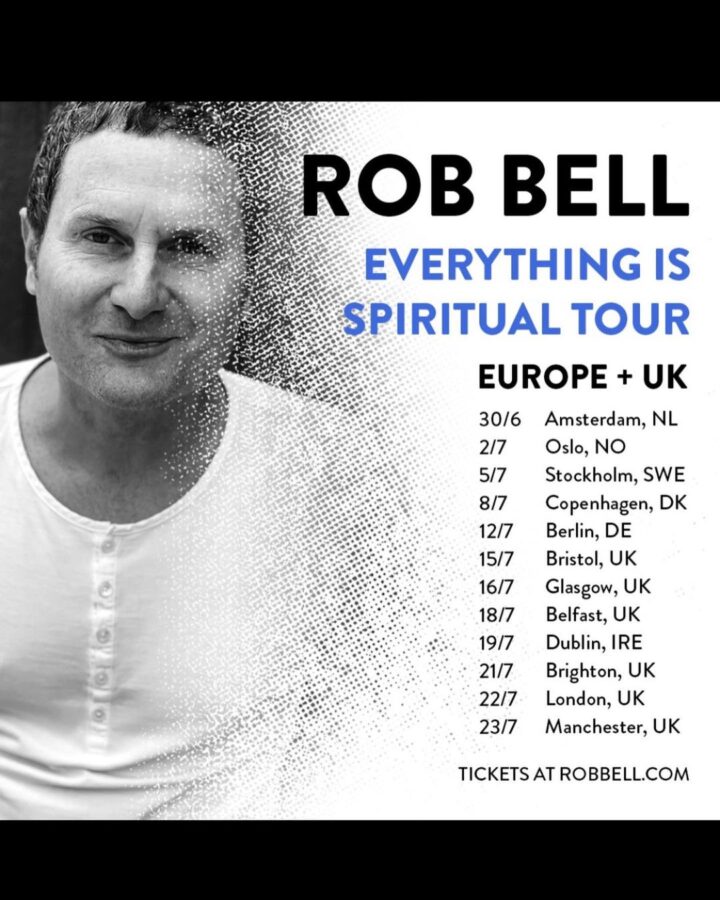
WATCH! Whatever Happened to “NO HELL ROB BELL” Who Received the “Kiss of Death” From “Prophetess Jezebel” Oprah as Does all Preachers She Likes? Protestia Does an Excellent Detailed Exposé of What Has Happened to the Heretic Rob Bell Since he Played the False Prophet Like Carlton Pearson and Told the World There is no Hell Some Twelve Years Ago. Rob Bell, along with other things, has been reduced to a comedian at The Largo — a comedy club in Los Angeles, where he performs frequently. Protestia Reports That Bell’s False Teaching “has difficulty taking root in the lives of true believers, given he’s long been exposed for the God-hating, Christ-despising, Holy-Spirit blaspheming pagan that he is.”
Listen to and watch Daniel Whyte III rebuke and refute Rob Bell in his 4-part series done 12 years ago titled “HELL: Do We Really Believe It? A Biblical Response to Rob Bell by Daniel Whyte III”
An Update on Rob Bell From 2011-2024
For many, the last they heard from Rob Bell was in 2011. He had risen to prominence in the early 2000s, fueled by his popular NOOMA videos which kickstarted his mainstream fame, and later on with a series of books like Velvet Jesus, Sex God, and Jesus Wants To Save Christians. Imbued with a gift for speaking and a propensity to
write things
deep things
in this style
he gained a massive following before social media really took off. He founded Mars Hill Bible Church in 1999, and within two years it had grown to one of the biggest churches in America, averaging almost 10,000 each service and making him a sought-after speaker. He was a rockstar in Evangelical circles whose materials were a mainstay for mainline youth groups. Seen as a thought leader and a key player in the emergent church, it was believed that his influence would only grow.
He was also fodder for nascent discernment ministries who took some early potshots at him for aberrant theology. They would point to a throwaway line in Velvet Elvis where Rob Bell said that the virgin birth wasn’t that important, or the vagueness in which he spoke of the gospel and Jesus’ death on the cross, and hold these words up to scrutiny as proof he was unorthodox. Still, there was never enough to convince most people that he was dangerous. His words weren’t great, but they were no smoking gun for the masses to see. He was just too vague and a little too nebulous that his defenders cried foul, dismissed the critics, and nothing really stuck.
Then, at the height of his fame, he released a book in March of 2011 titled Love Wins, which served as a full-throated defense of Universalism. The book argued that in the end, all people are ultimately saved because God is love and “love wins.”
The release of this book finally served as a big flashing light to many who were either ignorant of Rob Bell’s beliefs or who had been wary of labeling him a heretic and continued to view him as a brother, being regarded as possibly a bit of provocateur, but our provocateur. They were able to explain away and needlessly give him the benefit of the doubt for many things he said, but this was one step too far. It made national news and was the talk of Christendom for weeks, prompting John Piper to infamously tweet “Farewell Rob Bell” as Rob was cast out of the kingdom.
To get an idea of the cultural impact this book wrought, In June 2011, Time Magazine named Rob Bell as one of the Top 100 most influential people in the world. Due to the book’s release, he became even more famous for a season, but it also had dire consequences at home.
A lot of his congregants supported him, but many did not. Before his book launch, Mars Hill had 10,000 attendees over two services on a Sunday morning. By the time he stepped down in September, six months after the book’s release and after months of hemorrhaging people, attendance had dropped 65% to less than 3500 people. His last day was January 8th, 2012, and after that, he vanished off the face of the earth.
For a while
But what has Rob Bell been doing since?

He moved his family out of Michigan and to the East Coast. Making his home in Los Angeles, he has kept busy within the entertainment industry, becoming more and more forceful in his heretical beliefs and spreading forth his profanation far and wide without the constraints of his local church to more or less keep him in line.
In 2013, he was interviewed by Oprah for her Super Soul Sunday television program about his new book What We Talk About When We Talk About God, which she recommended in her “Book of the Month” club. Bonding over similar spiritual beliefs, he went on the road with her in 2014 on The Life You Want tour, gaining even more exposure and speaking on vaguely spiritual things with a distinct new-age feel. He mentioned God on occasion, but nothing that resembled biblical Christianity, which would have been an affront to Orpah’s audience.
More to his degeneration, whereas before he stepped down from the pastorate he had been vague and coy on questions of biblical sexual ethics when asked by interviewers, Rob Bell came out openly in favor and acceptance of same-sex marriage in 2013. He spoke favorably of it during his 2014 book tour, “The Zimzum Of Love,” and likewise when appearing again with Oprah in 2015 during an interview, saying
“One of the oldest aches in the bones of humanity is loneliness. Loneliness is not good for the world. Whoever you are, gay or straight, it is totally normal, natural and healthy to want someone to go through life with. It’s central to our humanity. We want someone to go on the journey with.
I think culture is already there and the church will continue to be even more irrelevant when it quotes letters from 2,000 years ago as their best defense, when you have in front of you flesh-and-blood people who are your brothers and sisters, and aunts and uncles, and co-workers and neighbors, and they love each other and just want to go through life.”
In 2015, he started The Robcast, a podcast with over 350 episodes of occasionally spiritualish stuff that is still going to this day. (He might interview a rabbi one day and then talk to a celebrity about anxiety another day). He toured extensively all over the world- France, Germany, the Netherlands, the UK, – visiting these countries and doing workshops, speaking at events, and teaching people how to be creative.
On top of devolving into a mass of liberal, progressive new-ageism, one of the most prominent targets and themes of all his projects is the idea that the Bible is “literary, but not literal.” To put it more bluntly, he regards the scriptures as bovine scatology.
He released a book in May 2017, “What Is the Bible?: How an Ancient Library of Poems, Letters, and Stories Can Transform the Way You Think and Feel About Everything to explain the scriptures to those confused by it. Gary Gilley does a great job of laying out several of Rob Bell’s theological convictions regarding the sacred texts:
“Probably the main message drawn from What Is the Bible? Is that the Bible is a thoroughly human book. It “is not a Christian book”; it “is a book about what it means to be human” (p. 4). It is not about Jesus and a narrow way to God (p. 16). Rather the Bible is a book produced purely by people sans any direct revelation from God (pp. 116-117, 188, 243-246, 266-267, 291, 295-296).
As a result, the Bible has all the problems, errors, contradictions, and wrong values that can be found in any human literature: “The Bible was written by people. People with perspectives, grounded in their cultures and times and places” (p. 243). Thus “God didn’t set up the sacrificial system. People did” (p. 244).
Further, in a 2017 interview with Lewis Howes, Rob Bell insisted that Jesus came to earth: “to wake us up and remind us of the shared humanity- the brother and sisterness of all of us.” On his belief of what the Bible is and how we should view it:
“The Bible has caused so much damage. In many ways it has often been an agent of dragging everything backwards, and it hasn’t participated in the ongoing evolution of humanity. It’s been a voice for primitive, outdated, violent, barbaric forces.”
At this point, much evidence suggests that he doesn’t even believe in a literal resurrection. Given that he has continued to twist the meaning of words, it’s hard to pin him down, but you get the impression that he doesn’t believe the literal resurrection of Jesus is a thing. He writes in his book:
“He’s alive? (Interesting that the people who were closest to Jesus and spent years with him don’t recognize him post-resurrection. Hmmm. The next time you hear someone insisting that it was an actual, literal resurrection, make sure you add that bodily must mean that he didn’t look like he looked before.)” What Is the Bible? (pp. 184-185).
Source: Protestia
To read more, click here: https://protestia.com/2024/01/05/whats-rob-bell-been-up-to-an-update-from-2011-2024/

